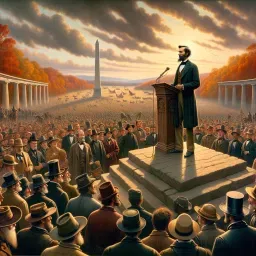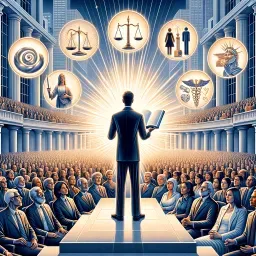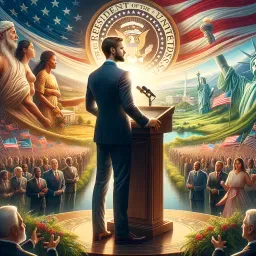”What is right and what is
practicable are two different things“

0
0
0
0
- Meaning
- Interpreting the phrase: It highlights the distinction between what is ethically or morally right and what is practically achievable. It underscores the reality that idealism often clashes with practicality. While one might know the 'right' course of action, various constraints – such as time, resources, or political realities – might necessitate a more feasible, although potentially less ideal, course of action. This can be applied in scenarios where tough decisions must be made, balancing ideals and real-world limitations.
- Allegory
- The diplomat at the crossroads embodies the decision-maker facing a moral dilemma, symbolizing the human condition of choosing between what is right and what is feasible. The "Right" path, with its utopian city, represents ethical idealism and moral purity; the thriving nature underscores the aspirational goals of humanity. Conversely, the "Practicable" path, leading to a bustling town, symbolizes realism and feasibility. The town's diversity and infrastructure represent pragmatic progress and achievable change. This allegory captures the essence of balancing idealism with practical constraints, evoking a thoughtful reflection on ethical decision-making.
- Applicability
- In personal life, the meaning of this phrase can guide individuals in making balanced decisions. For instance, in the workplace, while it might be 'right' to support a colleague fully in need, it's often more practicable to offer help within one's capacity without overextending oneself. It teaches the art of finding a middle ground between ideal actions and feasible actions in everyday scenarios.
- Impact
- This phrase has undoubtedly influenced political discourse and ethical decision-making by emphasizing the need for pragmatism. It has been cited in political arguments, leadership training, and strategic planning, underlying the importance of balancing ideal goals with practical solutions. Real-world applications of this principle can also be observed in international diplomacy and business negotiations.
- Historical Context
- The historical context of this phrase likely stems from the early 20th century, a period of significant social and political upheaval. Thinkers and leaders like Franklin D. Roosevelt, who navigated the Great Depression and World War II, often had to balance ideal policies with practical constraints, embodying the essence of this sentiment.
- Criticisms
- The primary criticism of this phrase is that emphasizing the practicable over the right can sometimes lead to the justification of unethical decisions for the sake of convenience or efficiency. Critics argue that it can serve as an excuse to avoid difficult but necessary moral decisions, potentially eroding ethical standards.
- Variations
- Variations in this phrase can be seen in different governance styles across cultures. In Eastern philosophies, especially Confucianism, there's often an emphasis on harmony and the practical implementation of ethical teachings. This phrase might be interpreted differently as the balance between "理" (principle) and "实际" (practicality) in Chinese philosophy, emphasizing that practical solutions should still align with core ethical principles.
-

Fourscore and seven years ago our fathers brought forth on this continent, a new nation, conceived in Liberty, and dedicated to the proposition that all men are created equal.
-

There's nothing left to do but get drunk.
-

The buck stops here.
-

National honor is national property of the highest value.
-

The goal to strive for is a poor government but a rich people.
-

It is easier to do a job right than to explain why you didn't.
-

A public office is a public trust.
-

If men were angels, no government would be necessary.
-

He serves his party best who serves the country best.
-

It is not strange... to mistake change for progress.
-

Speak softly and carry a big stick; you will go far.
No Comments